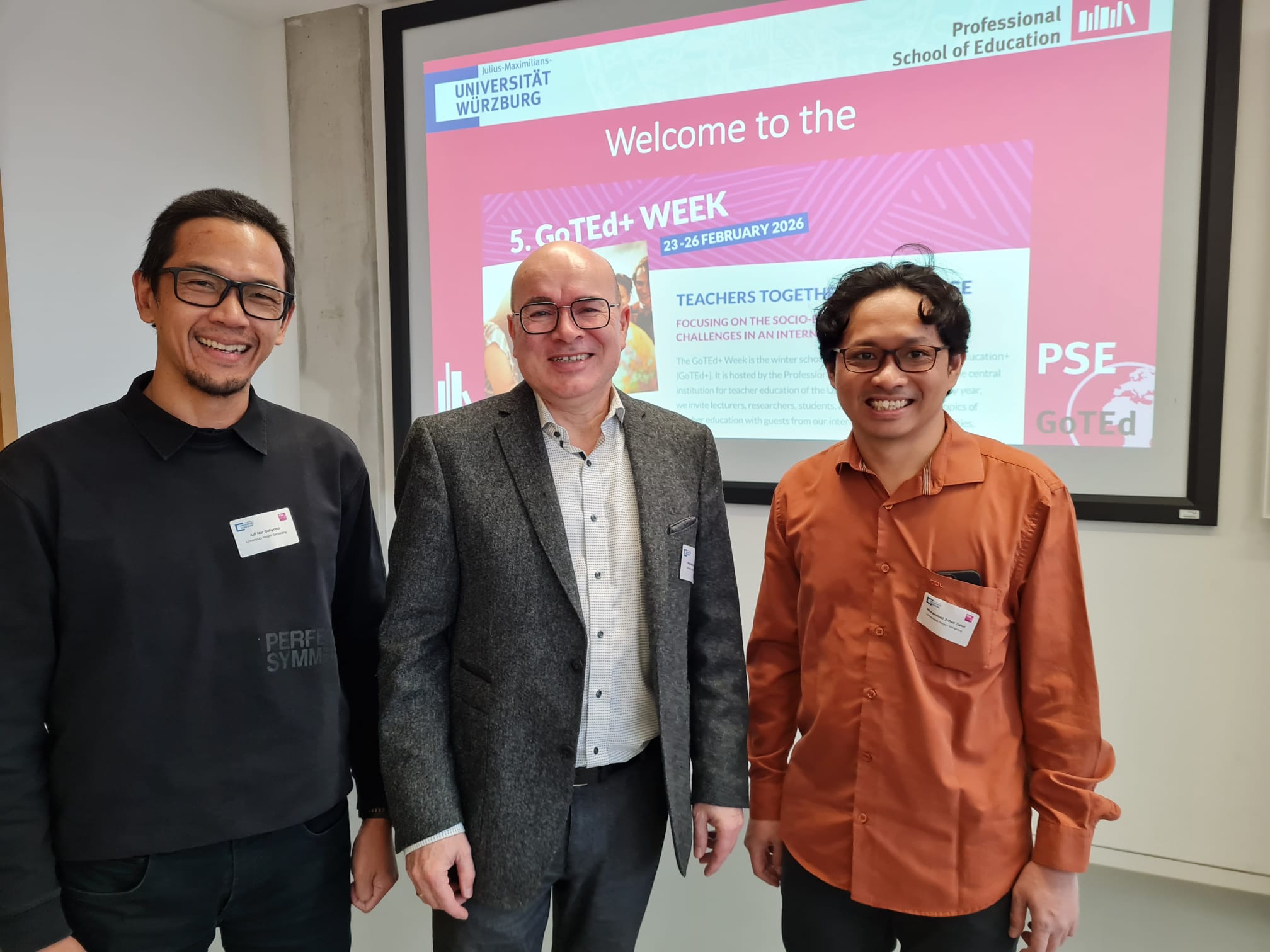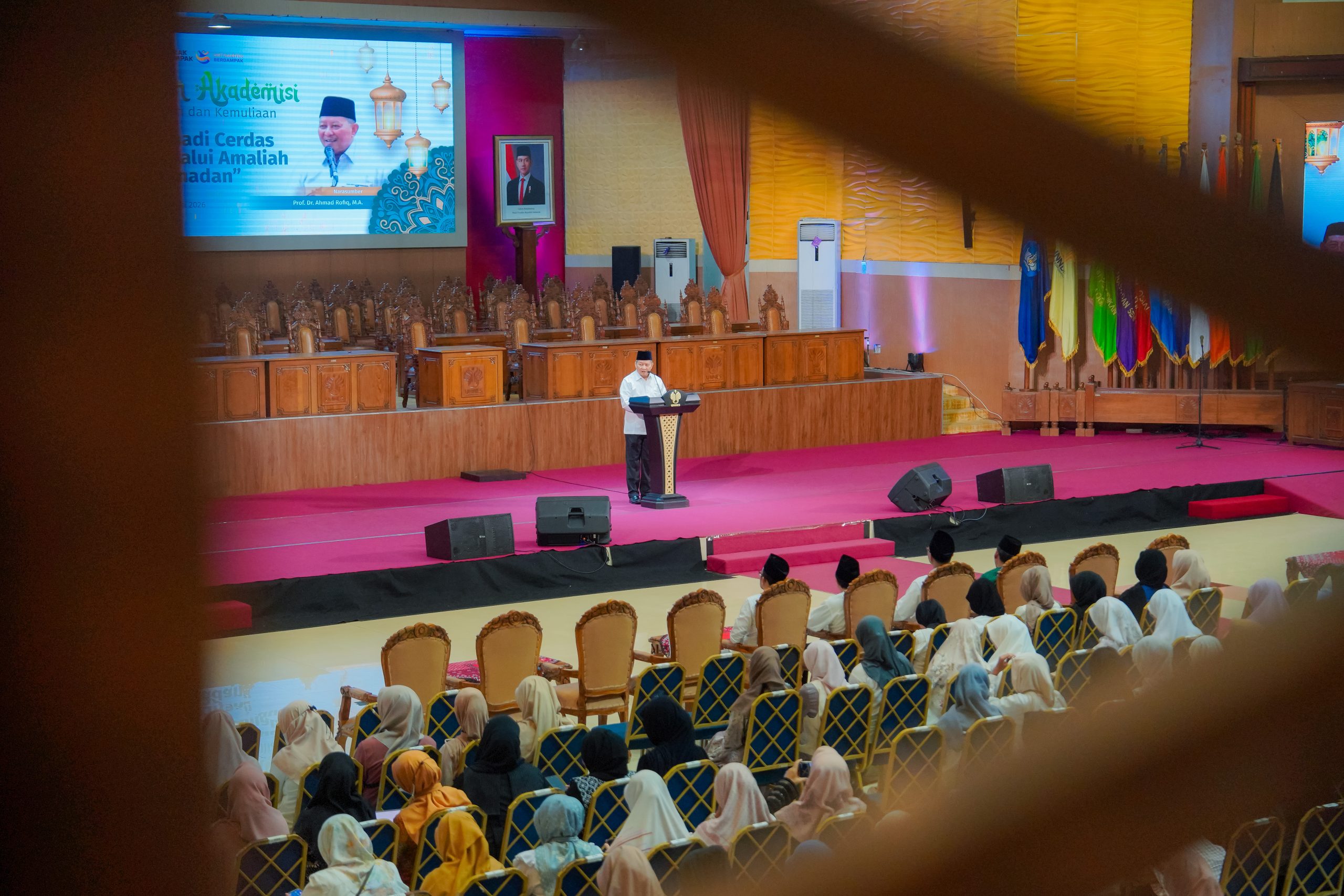Universitas Negeri Semarang (Unnes) Kamis (21/5) bertambah satu Profesor. Yakni Prof Dr Ir Saratri Wilonoyodho dari Fakultas Teknik. Upacara pengukuhan dipimpin oleh Rektor Prof Dr Fathur Rokhman MHum di auditorium kampus Sekaran.
Hadir, Drs Ali Mufiz MPA (Mantan Gubernur Jawa Tengah), Prof Dr Sudharto P Hadi (Mantan Rektor Undip), Prof Sugiono Utomo (Undip), Prof Mujahirin Tohir (Undip), Prof Dr Andreas Lako (Unika Soegijapranata), Prof Fatimah Muis (Undip), Dra Tjondroni Mkes (BKKBN Provinsi Jawa Tengeh).
Prof Fathur Rokhman saat memberi sambutan menyampaikan, Prof Dr Ir Saratri Wilonoyudho MSi ini merupakan Profesor ke-101 Unnes, sebagai Profesor Bidang Kependudukan dan Lingkungan.
Prof Fathur juga mengemukakan, peran seorang Profesor diantaranya yakni menguatkan budaya dan atmosfir akademik dengan meningkatkan karya inovasif dan publikasi ilmiah, melahirkan generasi inovasi yang unggul dan berkarakter, menjadi daya dorong peran akademik dan kamanusiaan dari Unnes bagi Indonesia dan dunia.
Rektor berharap pencapaian Profesor bukanlah muara akhir dari pencapaian karir seorang dosen, namun harus tetap berkarya melahirkan karya-karya inovatif dan publikasi ilmiah di tingkat nasional dan internasional.
Selain itu, lebih peduli kepada persoalan lembaga, masyarakat, bangsa, dan menjadi inspirasi serta bermanfaat bagi kemaslahatan.
Prof Saratri Wilonoyodho saat pidato pengukuhan dengan tema ”Urbanisasi Berlebih: Menyongsong Pulau Jawa Menjadi Pulau Kota” menyampaikan, menurut beberapa ahli, persoalan yang menyertai pertumbuhan kota-kota di negara-negara berkembang merupakan kegagalan kebijakan industrialisasi modern di satu sisi dan kegagalan pembangunan pertanian di sisi lain (urban bias), sehingga urbanisasi semakin tidak terkendali.
Jakarta misalnya kini telah “menyatu” dengan Depok, Tangerang, Bogor, Bekasi (“Jabodetabek”) dan membentuk sebuah “megapolitan”.
Demikian pula Semarang dengan “Kedungsepur” (Kendal, Demak, Ungaran, Semarang, Purwodadi), atau Surabaya dengan “Gerbang kertasusila” (Gresik, Bangkalan, Mojokerto, Surabaya, Sidoarjo, Lamongan), dan juga kota Bandung Raya.
Studi kasus di Kota Semarang misalnya, menunjukkan bahwa kota ini tengah mengalami pertumbuhan penduduk dan pertumbuhan ekonomi yang sangat pesat. Kota Semarang memiliki “hinterland” atau daerah belakang yang meliputi kawasan Kedungsepur (Kendal, Demak, Ungaran, dan Purwodadi), yang batas non-administratif tidak jelas secara kasat mata, sehingga menyatukan wilayah Semarang dengan kota-kota di sekitarnya sehingga membentuk suatu “megapolitan”.
Megapolitan banyak membawa masalah diantaranya masalah lingkungan, lalu lintas, permukiman, sampai ke masalah-masalah sosial.
Hasil penelitian dua puluh tahun lalu oleh Sutomo (1994) misalnya, sudah menunjukkan bahwa telah terjadi aglomerasi spontan di sepanjang jalur regional Semarang berupa kegiatan komersial dan ditandai oleh restrukturisasi internal, dengan ciri utama adanya pergeseran fungsi kota inti dari pusat manufaktur menjadi pusat-pusat kegiatan bisnis dan jasa.
Pada sisi lain, kegiatan manufaktur bergeser ke pinggiran kota. Secara fisik restrukturisasi ini ditandai dengan perubahan penggunaan lahan secara besar-besaran karena munculnya perumahan-perumahan baru dan lokasi pabrik.
Data BPS (2007) menunjukkan bahwa pada tahun 2001-2007 di Kecamatan Sayung Demak, yakni kecamatan yang berbatasan langsung dengan Kota Semarang telah terjadi konversi lahan sawah dari 3.000 ha menjadi 2.476 ha. Demikian pula konversi lahan sawah di perbatasan Kabupaten Kendal dan Kota Semarang juga terjadi di Kecamatan Kaliwungu, yakni dari 1.572 ha pada tahun 2000 menjadi 1.472 ha pada tahun 2007.
Dari konversi lahan pertanian yang cukup pesat ini, maka dapat dipahami jika laju pertumbuhan ekonomi dari sektor pertanian di Demak juga menurun dari 3,26 persen dari total PDRB pada tahun 2005 menjadi hanya 2,76 persen pada tahun 2007.




Selamat Prof. Saratri, semoga amanah